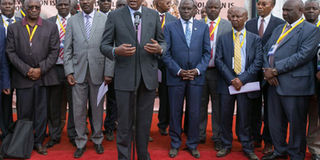Uhuru, governors agree devolution a success, cite improved healthcare

President Kenyatta and governors when they issued a joint statement on doctors' strike on March 7, 2017 in Naivasha. He claims the medics work for two hours a day in public hospitals. PHOTO | PSCU
What you need to know:
- The president and Council of Governors chairman Peter Munya singled out health as one of the success stories for devolution, citing the reduction of child and maternal deaths.
- Tuesday's session included plenary discussions on economic and agricultural transformation and sustainable energy development steered by Kakamega Governor Wycliffe Oparanya, Vihiga's Moses Akaranga and Baringo Senator Gideon Moi, respectively.
The national and county governments were in agreement on Tuesday that devolution was a success and has transformed the country.
Even as they spoke, the two sets of government acknowledged that their relationship has not been rosy in the four years of devolution implementation.
The council of governors said the environment for implementation of devolution has not been amiable.
"We have had disagreements with the national government over funding for county functions, poor or absence of consultation on matters that affect county governments and little technical support for the implementation of functions," said CoG Chairman Mr Peter Munya.
Even as President Uhuru Kenyatta said the government will have had spent Sh1 trillion on counties by the next budget, the council of governors indicated that counties have suffered insufficient allocations and delayed disbursements by The National Treasury, which Mr Munya said, has nearly paralysed finalization of development projects.
"Moreover, there are functions that remain unfunded yet they have already been transferred to the counties," he stated.
AGREEMENT
Both governments, however, agreed to work together and to consult constantly to ensure the system introduced in Kenya four years ago takes root, with the president stating that critical oversight functions of The Treasury, Senate, Controller of Budget and the Auditor General had ensured the systems and individuals were accountable and transparent.
"Some have been left unhappy by their recent findings of impropriety and financial mismanagement. In fact, these findings reflect the fact that the systems which track the systems of money are in good working order," the president said. "That is how we keep leaders honest and accountable," he added.
President Kenyatta described devolution as one of the key priorities of his administration while devolution cabinet secretary Mwangi Kiunjuri promised the national government's support to resolutions to be arrived at the fourth annual devolution conference taking place in Naivasha.
SUCCESS STORY
"Four years ago, the Kenyan people handed me the privilege to implement this fundamental change. I am pleased to see that the institutions we set up to support the aspirations of Kenyans stand firm. Devolution is here to stay," the president said in his keynote address to the conference taking place at the Kenya Wildlife Service Training Institute.
The president and Council of Governors chairman Peter Munya singled out health as one of the success stories for devolution, citing the reduction of child and maternal deaths.
"Maternal deaths and infant mortality rates have fallen quickly, proof that the joint free maternity proramme between the national and county governments works," the president said. "The medical equipment scheme on which nearly every county has played a part has given Kenyans access to life saving screenings for cancer and other diseases," he said.
Mr Munya on the other hand described devolution as the 'real deal.' "Counties are proof that devolution is the real power," he said.
He said counties had prioritised primary health care, community facilities and also focused on eliminating infant mortality leading to a drop of up to 39 per cent in infant deaths per 1,000 live births.
"In 2012, there were 8,466 health centres and dispensaries. We have increased this to 10,032 and invested heavily in equipping delivery wards with incubators." he said. "These investments have paid off."
Tuesday's session included plenary discussions on economic and agricultural transformation and sustainable energy development steered by Kakamega Governor Wycliffe Oparanya, Vihiga's Moses Akaranga and Baringo Senator Gideon Moi, respectively.
The conference was attended by ambassadors who included Mr Robert Godec of US, his British counterpart Nic Hailey and European Union's Ambassador to Kenya Stefano Dejak who is the chairman of the donors' community.
In the roads sector, the council of governors said county governments had surmounted financial and legislative huddles between 2013 and 2016 which saw 379 kilometres tarmacked, 35,934 kilometres murammed, 19, 148 kilometres of new roads and 9,572 kilometres of rehabilitated roads.
"These successes have been attained amidst stiff opposition and deliberate underfunding by the national government, Mr Munya said, citing the 2016/2017 and 2017/2018 Financial Years where no funds have been allocated to counties to support additional 31,113 kilometres of roads.
By Caroline Wafula, Njeri Rugene and Dave Opiyo




